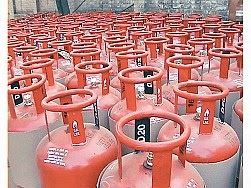Police to run LPG Bottling Plant after Crisis
advertisement
March 15, KATHMANDU,
The
Nepal Police has decided to operate its own liquefied petroleum gas
(LPG) bottling plant in a bid to increase the government’s supply
capacity during crises.
A
meeting between the Police and state-owned suppliers -- Salt Trading
and National Trading -- coordinated by Chief Secretary Leela Mani Paudel
on January 13 had decided to allow the security agency to run a gas
bottling plant, according to Senior Superintendent of Police Laba Bista.
Given
the trend of private sector gas plants and dealers creating artificial
shortage of cooking gas, the government came to the conclusion that the
police should be allowed to operate the plant.
The
plant will be operated under the Welfare Fund of the Nepal Police, said
Bista, who heads the Welfare Division of the Nepal Police. He said they
have sent a proposal to state-owned fuel supplier Nepal Oil Corporation
seeking its permission.
The
targeted customers of the plant would be Nepal Police personnel and the
general public inside the Kathmandu valley. “Once the production
begins, police personnel will get the gas at a subsidised rate.”
Bista
said they would conduct a detail feasibility study once the approval is
granted. “For now, we see Dhading and Kavre the best sites to set up
the plant,” said Bista.
The Post’s repeated attempts to contact NOC Managing Director Gopal Bahadur Khadka were unsuccessful.
LPG
cylinder has suddenly become the most sought-after commodity in the
Kathmandu valley. Last month, hundreds of people were seen standing
outside retail shops to get cylinders. The shortage has triggered
spontaneous protests across the country, including in the Kathmandu
valley.
“The
government has realised the state supply mechanism needs to be
strengthened following the four-month cooking gas shortage in the
country,” said an official at the Ministry of the Commerce and Supply.
“The shortage still persists.”
NOC
blames the private bottling plants do not cooperate to ease the supply
despite adequate imports. It says the shortage is a result of rampant
black-marketing and hoarding. RSS
advertisement












0 comments